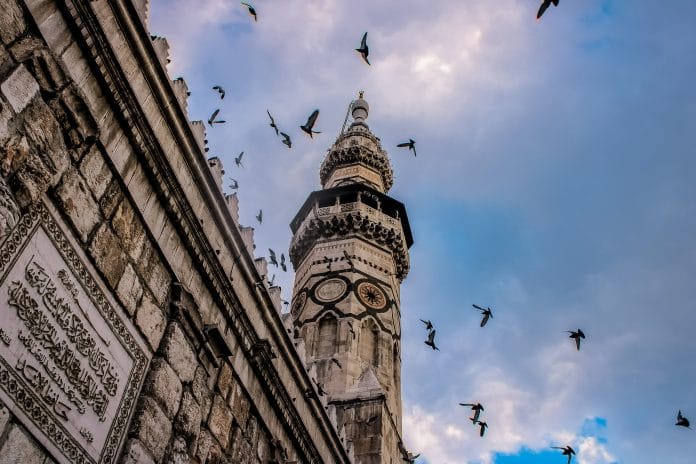The Government of Finland and the United Nations Development Programme (UNDP) Syria signed an agreement today worth EUR 4,000,000 to support the resilience of persons with disabilities (PWDs) and advance a holistic approach to disability inclusion in Syria.
The support to be provided through this agreement aims to directly build the resilience of and improve the livelihoods of about 2,000 PWDs and builds on an existing partnership between Finland and UNDP (2018-2022) that has resulted in supporting 5,944 PWDs for physical and mental as well as livelihood support and providing 71 service providers, working in disability inclusion, health, accessibility, psychosocial support, and policy making with capacity building opportunities.
28% live with some form of disability
In Syria, more than one in four individuals or 28 percent of the total population aged two and above live with some form of disability. PWDs are disproportionately affected by the ongoing socio-economic impacts of the COVID-19 pandemic and other external and internal factors, such as the fallout from the Lebanese financial and political crisis, the rapid depreciation of the Syrian currency, and severe inflation, all of which have exacerbated needs. Due to attitudinal, environmental, and institutional barriers that are reproduced in the COVID-19 context, they have faced structural inequalities, undermining their social, economic and health needs.
Finland’s contribution comes at a time when humanitarian needs across Syria are at their most acute since the crisis began, with deteriorating socio-economic conditions and widespread poverty, estimated at 90 percent of the population.
Bombs leave marks on human beings
“When people think of war, they usually see mental images of destroyed buildings, but we must not forget that bombings leave their marks on human beings too. The Syrian war that has lasted over 11 years has ravaged the country and had a tremendous impact on the lives of innocent people. We are proud of our long partnership with UNDP who is working on a daily basis in the field helping the most vulnerable Syrians, women and children, to build a better future. I have had the possibility to travel several times to Syria and I’ve seen with my own eyes this sentiment of hope glowing in the faces of all the mothers who wish that someday their children will be able to live their lives fully. With this renewed partnership with UNDP to strengthen resilience we will be able to continue our work with those who are most in need of help in this conflict, the people with disabilities.” said Ms. Tarja Fernadez, Charge d’Affaires of the Embassy of Finland in Syria.
Physical rehabiliation
A key component of the project is to improve health and functional outcomes of PWDs by enhancing physical rehabilitation and mental health services. Additionally, the project will enhance the livelihoods of PWDs’ households by improving their access to income-generating activities and other socioeconomic opportunities. This intervention will target PWDs with various livelihood support, including vocational and skills training, employment services, entrepreneurship development and agricultural livelihoods. The project will also aim to address multiple barriers to inclusion by taking a multi-sectoral approach to alleviating physical, legal and social obstacles and creating an enabling environment for inclusion.
“UNDP Syria recognizes disability inclusion as an essential requirement for advancing the implementation of the SDGs and promotes the rights of PWDs in Syria in line with the guiding principles of the Convention on the Rights of Persons with Disabilities (CRPD) such as non-discrimination, participation and inclusion, equality of opportunity, respect and dignity, and respect for diversity, which are fundamental for building an inclusive and cohesive society in Syria,” said Ramla Khalidi, Resident Representative of UNDP Syria. “Inclusive policies and programmes are sound investments in society, and both the SDGs and the CRPD are mutually reinforcing and critical for developing an effective disability inclusion and overall early recovery and resilience programme. We are very grateful for the Government of Finland’s continued partnership with UNDP to scale up the scope and coverage of its disability inclusion programme.”
Within the two-year project, UNDP will also strengthen disability support service delivery by developing service delivery’s human and institutional capacities. Such investment will ensure sustainable and quality impacts that will serve many PWDs in the future. Given Finland’s wealth of knowledge, practice, and expertise on disability inclusion, this project will explore new partnerships with Finnish experts and institutions to help develop institutional capacities for PWDs support and disability inclusion.
The project is a critical contribution to UNDP’s strategy to support PWDs in Syria which is based on the human rights-based approach to disability in line with the 2030 Agenda for Sustainable Development, the CRPD as well as early recovery efforts in its pledge to leave no one behind.
For more information on UNDP Syria see https://www.sy.undp.org.




